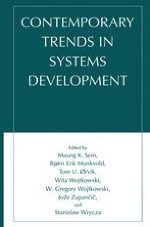2001 | OriginalPaper | Buchkapitel
To Err is Human
Implications for Information Systems Development
verfasst von : George J. Bakehouse
Erschienen in: Contemporary Trends in Systems Development
Verlag: Springer US
Enthalten in: Professional Book Archive
Aktivieren Sie unsere intelligente Suche, um passende Fachinhalte oder Patente zu finden.
Wählen Sie Textabschnitte aus um mit Künstlicher Intelligenz passenden Patente zu finden. powered by
Markieren Sie Textabschnitte, um KI-gestützt weitere passende Inhalte zu finden. powered by
The first section of this paper will summarize an ongoing action research project currently being undertaken by the author and a team of academics based at the University of the West of England (UWE, Bristol) spanning nearly a decade. This research project has developed an approach to embedding the tools and techniques of systems engineering in an action research framework (Bakehouse et al., 1995, 1997; Doyle, 1994; Waters et al., 1994). These projects have involved strategic, tactical and operational systems in transport (Lex Transfleet), health care (Frenchay Health Trust, Neurosciences) construction (Trafalgar House, WPE Homes), banking (Citibank), and other areas of the private sector. The theories, tools, techniques and methods adopted for the research program were selected on the basis of their relevance to the solution of real problems discovered in everyday working environments. The initial phases established a methodology that identifies, quantifies, and classifies information problems. The author progressed the research by developing a taxonomy of phenotypes of erroneous action that classified the “causes” of the information problems in terms of Human error.
